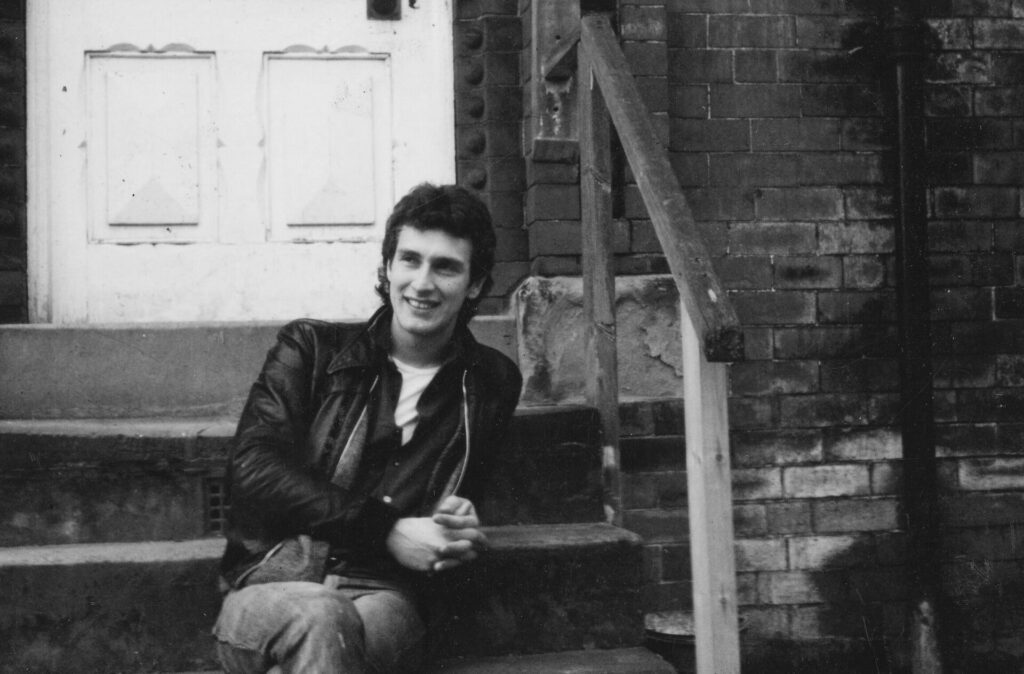To Hell With Poverty!, the new memoir from Gang Of Four singer, singer, lyricist and producer Jon King, is an account of his journey from South London slum to recording at Abbey Road with all the twists and turns of navigating the capricious music industry along the way. There are tales of band bust-ups and reconciliation, making the cover of the NME, getting chucked off Top Of The Pops, having their music censored (twice) and crashing and burning in America. At the forefront of the narrative, however, is the political stance of the band that ran at odds with the both the mainstream and far right in late 70s and early 80s Britain. Gang Of Four’s left-wing views often made them the target of The National Front, who’d crash their gigs looking for trouble – and the band made sure they got it. Bassist Dave Allen would wield his guitar at the NF thugs and the rest of the band frequently leapt in to fight them. With rather less punching involved, Gang Of Four also became one of the key voices in the Rock Against Racism movement in the north of England. The book tells stories of bust ups with the police, the racism they witnessed daily and how feminist bands like The Slits were an inspiration. “My ambition wasn’t to make money, but to change the world,” King says, reflecting on the legacy of the band. “Some of our songs are still horribly relevant but I wish they weren’t.”
Standing up to fascism meant standing up for my friends
In the 1970s, I went to a demonstration in Leeds against the National Front while I was studying art in the city. The council had banned them from marching through Chapeltown in Leeds. My Afro-Caribbean, African and white friends all lived in Chapeltown of course and that’s where they wanted to march: it was intentionally provocative. Despite the ban, the NF managed to get a meeting inside a local hall and I don’t know whether or not they deceived the council, but they decided they wanted to walk down to the railway station together and of course what they were really doing was taking part in the march that was banned in the first place. I remember protesting and shouting ‘The National Front was The Nazi Front’.
The police were our enemy
Things got out of control at the protest: it was entirely on the National Front’s side. The moment it got out of control, the cops reacted. I was truncheoned down by a cop and whacked on the forehead: I dropped to the ground. My interactions with the police at that time were never positive. I have great sympathy with people who are trying to keep the law, but that wasn’t what they were doing. All the ones we encountered at that time were aggressive blokes who liked asserting their authority. The recent trouble in Türkiye really struck me because I was sort of like one of those people in the crowd too.
There were unlikely allies on the streets
The irony of the NF demonstration was that the NF eventually went into the middle of the railway station and met Leeds United fans coming off the train from London. This was in the middle of peak football hooliganism and Leeds United fans at that time were among the most notorious football crews. The Leeds fans just thought they were all cockneys and so attacked them, which I thought was a kind of poetic justice!
Fighting fascists is hard
It was extremely tense sometimes waiting for the next battle with fascists at gigs. There was often a lot of trouble and they’d come along just to cause bother. With Gang Of Four, The Mekons and Delta 5, we sort looked out for each other at that time: we were the first set of bands in Leeds who identified as being of the left. A very good friend of ours had life changing head injuries through the violence. They came into Leeds university at a gig and threw a fire extinguisher at his head: he nearly died and was affected for the rest of his life. It was a very dark period.

Bass guitars make good pikes
We didn’t have bodyguards or anything at gigs, but certainly there were enough episodes of violence that we got quite good at defending ourselves. Dave [Allen] was really good at using his bass guitar like a pike. The one thing that you couldn’t do was show weakness. A lot of blokes are really pathetic – they’re like a pack of dogs and in all those situations, you’ve got to pick on the top dog because there’s always someone or other who’s egging them on. But I also think the more that that happened, the more you started thinking we must be doing something right with our music. We did a lot of work with Rock Against Racism; I met a guy recently in Leeds who said Gang of Four and The Mekons were like the house bands of Leeds Rock Against Racism. We did loads of shows for this and it was really important to us to stand up… in this particular fight.
Know your enemy…
In the book, I wrote about how Gang of Four were stitched up by the police. They planted stuff on us. The drugs were in a neatly wrapped thing the size of a Wrigley’s Spearmint gum. I mean, if you’re going to plant drugs, be a bit more sensible about it! Who would even have drugs like that?! We were taken in. Dave [Allen] got knocked around by the cops and they held us all day long and they did it because they could. We had a really top brief and they told us everything the police did to us was illegal. It was entirely wrong and we got sent a letter of apology. Had we been less well off or less well educated, we would probably have been stitched up.
The misogyny of the police doesn’t seem to change
We were also in the shadow of [serial killer] Peter Sutcliffe back then too, and that really showed up the racist, sexist, misogynist police force. It was full of these terrible men who didn’t care until some “innocent” young student was killed. All of those women were innocent. So little [has changed]… my daughters were very affected by the death of Sarah Everard and then for the police [to behave as they did] at the remembrance event – it was filthy. An actual police officer murders someone and women have a quiet vigil where everyone’s sobbing their eyes out and the cops go nuts.
Feminism showed us the way
There were some powerful feminist voices about then, especially The Slits, who were absolutely not going to conform to your view of what women were supposed to be. People fighting power of any kind learned a lot from them. One of the best things I remember was when I saw Ari Up on stage: a guy from the audience shouts something sexist [“show me your c***”] and Ari shouted back, “I’ll show you a c***!” before jumping into the crowd and punching him in the face. We all dived in too in support. We also had Reclaim The Night after Peter Sutcliffe, which was an important movement. We wrote the song ‘It’s Her Factory’, inspired by the 1970s feminist Wages for Housework Campaign about women’s rights. The song still sadly resonates today.
It’s worth risking being banned
We had two of our singles banned by the BBC [and famously got thrown of Top Of The Pops]. When I wrote ‘At Home He’s A Tourist’ and ‘I Love A Man In A Uniform’, I wasn’t trying to write something to be banned, but if you write something that is not part of the dominant narrative, then you know that it’s dangerous. This is good because they don’t like it: the dominant powers always try to crush the voices of non-dominant powers.
Culture will save us
I think these days, it’s far more difficult to be publicly radical because again, thinking of the people in Türkiye or elsewhere, with AI face recognition systems and the widespread and almost total monitoring of people’s emails and messaging you can be identified instantaneously. And of course, we walk around with phones [which are]tracking devices. I think the freedom to protest was a sort of short-lived window. It’s very difficult to have the freedom to live in a democratic society in many parts of the world right now. The only thing that can save us from all this is culture. A good future will depend on culture coming up with the goods, somehow or other.
Jon King’s new memoir To Hell With Poverty! is out now via Constable



